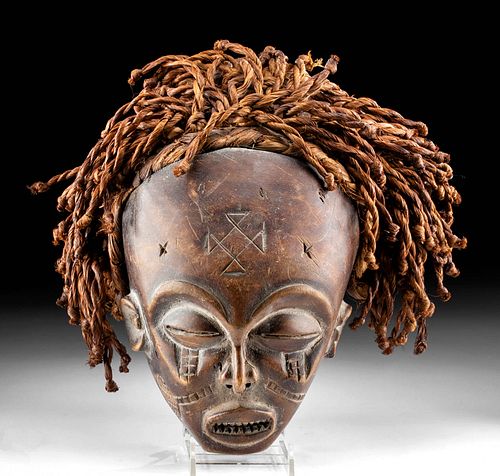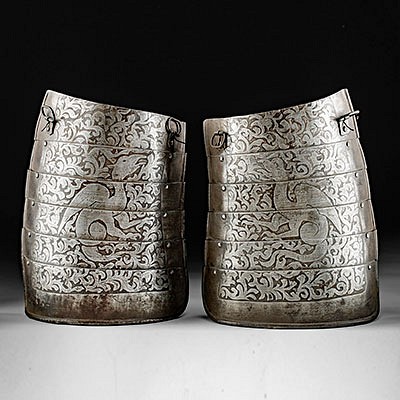Early 20th C. African Chokwe Wooden Mwana Pwo Mask
Lot 99c
About Seller
Artemis Gallery
686 S Taylor Ave, Ste 106
Louisville, CO 80027
United States
Selling antiquities, ancient and ethnographic art online since 1993, Artemis Gallery specializes in Classical Antiquities (Egyptian, Greek, Roman, Near Eastern), Asian, Pre-Columbian, African / Tribal / Oceanographic art. Our extensive inventory includes pottery, stone, metal, wood, glass and textil...Read more
Categories
Estimate:
$900 - $1,400
Absentee vs Live bid
Two ways to bid:
- Leave a max absentee bid and the platform will bid on your behalf up to your maximum bid during the live auction.
- Bid live during the auction and your bids will be submitted real-time to the auctioneer.
Bid Increments
| Price | Bid Increment |
|---|---|
| $0 | $25 |
| $300 | $50 |
| $1,000 | $100 |
| $2,000 | $250 |
| $5,000 | $500 |
| $10,000 | $1,000 |
| $20,000 | $2,500 |
| $50,000 | $5,000 |
| $100,000 | $10,000 |
| $200,000 | $20,000 |
About Auction
By Artemis Gallery
Nov 12, 2020
Set Reminder
2020-11-12 12:00:00
2020-11-12 12:00:00
America/New_York
Bidsquare
Bidsquare : Arms & Armor | Antiquity to Modern Day
https://www.bidsquare.com/auctions/artemis-gallery/arms-armor-antiquity-to-modern-day-6023
Specialty auction featuring axes, mace heads, swords, spears, various types of armor, and more! Many different cultures and price ranges. Great for first-time buyers, seasoned collectors, dealers, and that hard to buy for person on your holiday shopping list. Artemis Gallery info@artemisgallery.com
Specialty auction featuring axes, mace heads, swords, spears, various types of armor, and more! Many different cultures and price ranges. Great for first-time buyers, seasoned collectors, dealers, and that hard to buy for person on your holiday shopping list. Artemis Gallery info@artemisgallery.com
- Lot Description
Central Africa, Angola, Zambia, and Democratic Republic of the Congo, Chokwe peoples, ca. 1920s CE. A fine example of a hand-carved wooden face mask known as a Mwana Pwo with stylized physiognomy and a coiffure formed from woven raffia strands. The intricate visage presents with bulging ovoid eyes beneath high-arching brows, a slender nose between angular cheek bones, cupped ears, a narrow mouth with two rows of incised teeth, and several areas bearing incised scarification marks. The tall forehead is embellished with petite X's on either side of an ornate, four-lobed cross indicative of the beauty inherent to initiated female members of society. Lucite display stand for photography purposes only. Size (w/o hair): 6.25" W x 8.25" H (15.9 cm x 21 cm)
This mask may symbolize the figure of Mwana Pwo, an archetypal female ancestor, socially significant particularly because the Chokwe trace their ancestry through their maternal lines. The scars on the face are an indicator of beauty as well as ethnic identity. Masks from this culture are often used at initiation rites to welcome people into the adult world.
Cf. The Metropolitan Museum of Art, accession number 2003.288a, b
Provenance: private Houston, Texas, USA collection, purchased in 2013; ex-Robert Bartos collection, San Juan, Puerto Rico
All items legal to buy/sell under U.S. Statute covering cultural patrimony Code 2600, CHAPTER 14, and are guaranteed to be as described or your money back.
A Certificate of Authenticity will accompany all winning bids.
We ship worldwide and handle all shipping in-house for your convenience.
#156484Light wear on surface commensurate with age including some small areas of inactive insect damage, scratches, chips, and nicks. Overall in very fine condition with details well preserved and rich patina.Condition
- Shipping Info
-
All shipping is handled in-house for your convenience. Your invoice from Artemis Gallery will include shipping calculation instructions. If in doubt, please inquire BEFORE bidding for estimated shipping costs for individual items.
-
- Buyer's Premium



 EUR
EUR CAD
CAD AUD
AUD GBP
GBP MXN
MXN HKD
HKD CNY
CNY MYR
MYR SEK
SEK SGD
SGD CHF
CHF THB
THB














